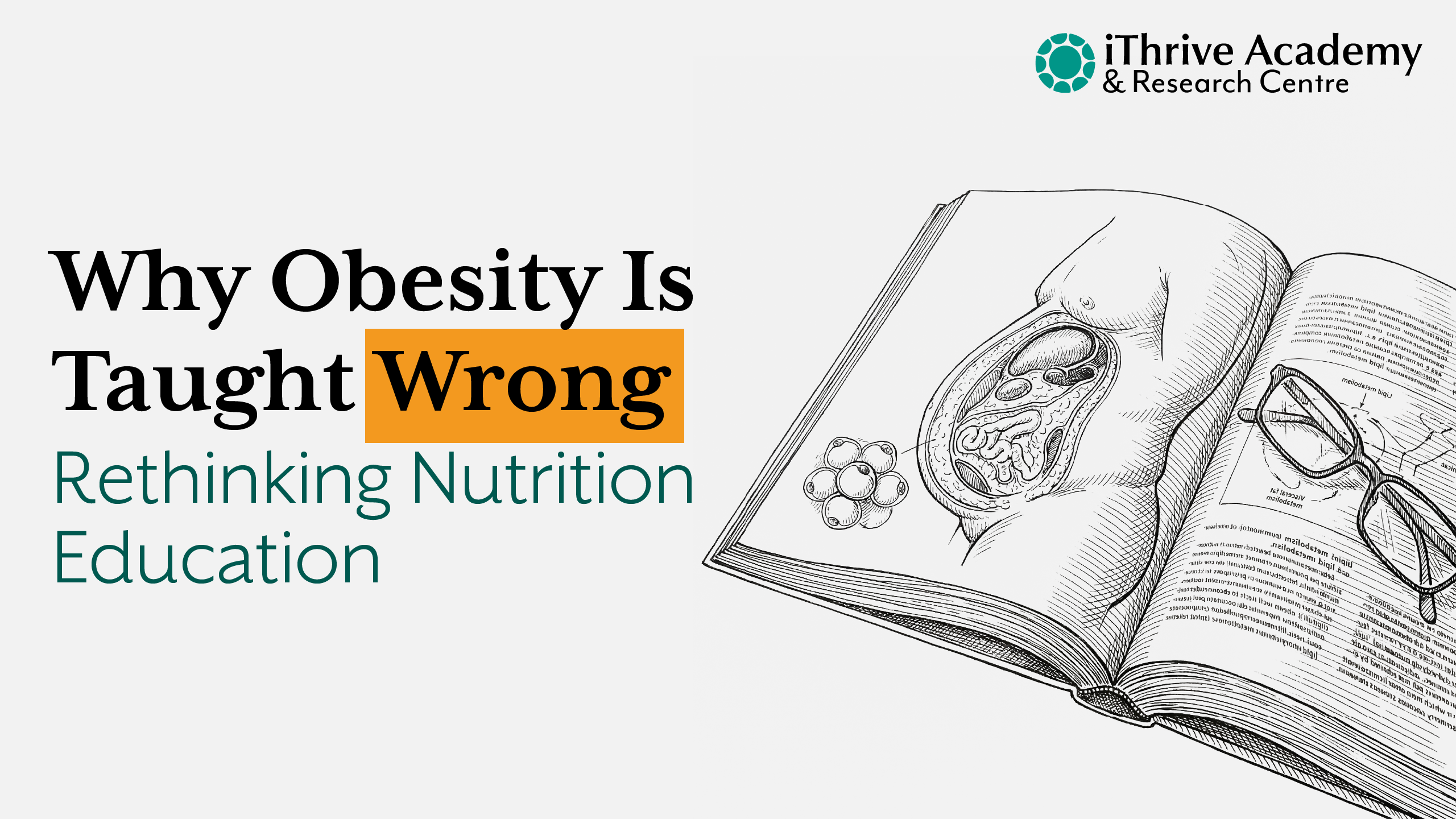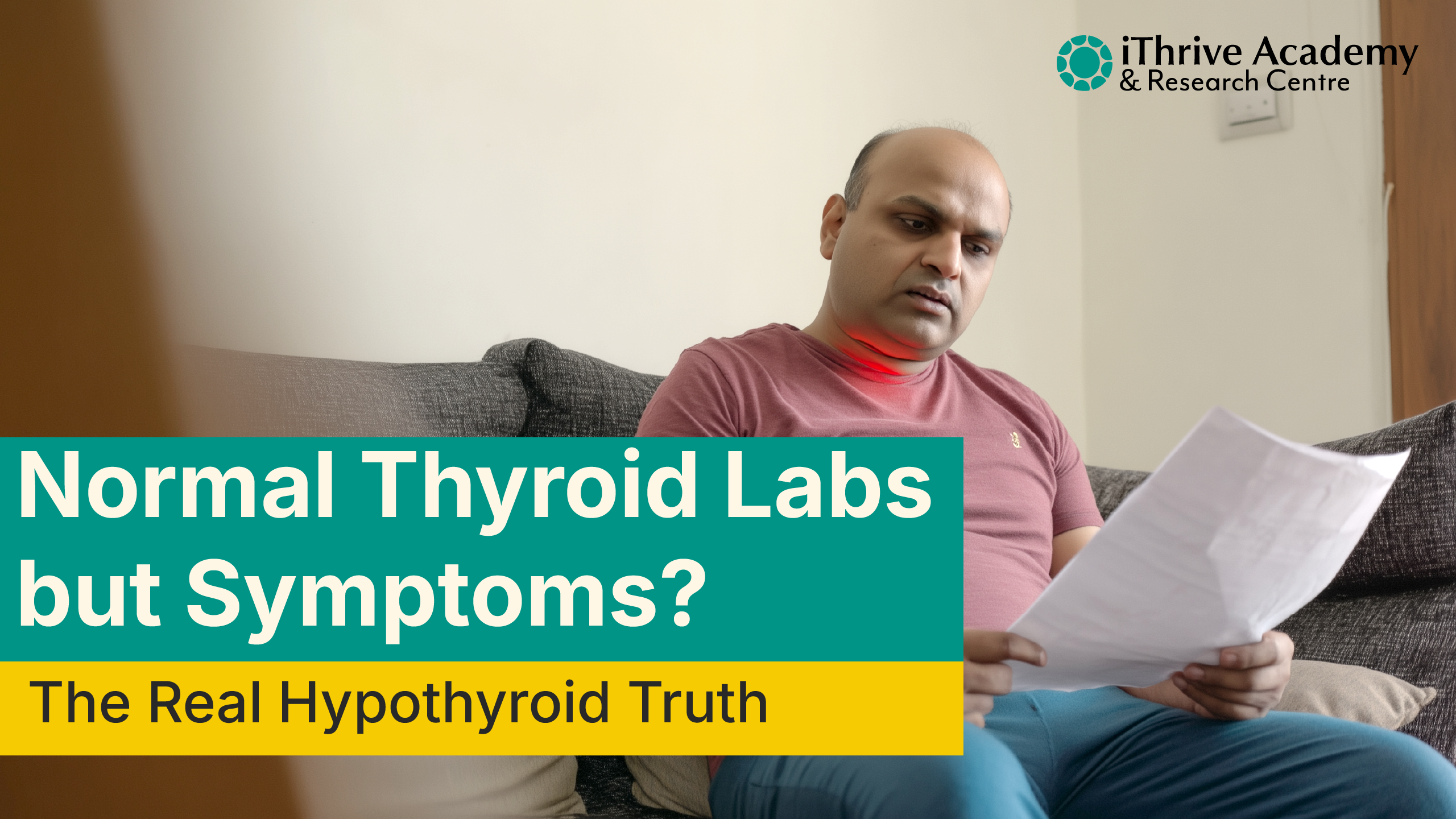Introduction: From Festive Indulgence to Functional Reset
The sweets, lights, and joys of Diwali bring warmth to the heart, but also a little chaos to the gut. After a couple of days of heavy foods, late night sugar-loaded desserts, and smoke-filled celebrations, the natural detox system of the body works overtime. Skin dullness, fatigue, brain fog, and bloating are the signs your mitochondria, liver, and gut are asking for a little Post-Diwali care.
This is where Functional Nutrition truly shines, it’s really not about quick juice cleanses or skipping meals but it’s all about restoring biological balance via nutrient intelligence. At iThrive Academy, India’s first academy to teach Functional Nutrition, we teach how true detoxification is not deprivation, it is rather cellular nourishment.
So, if you are ready to bounce back from festive indulgence the functional way, here are 5 nutrition-backed steps for restoring energy, metabolic balance, and clarity, all of it rooted in nature and science.
.webp)
Reignite Your Liver’s Detox Power with Functional Foods
Your liver is the main detoxifying organ of your body, which is responsible for breaking down alcohol, sugar, and toxins into harmless compounds. But after festive overload, it can feel a bit sluggish.
Instead of restoring to extreme “juice cleanses,” emphasize on nutrients that powers both Phase I along with Phase II liver detox pathways.
Key Functional Nutrients & Foods:
- Sulforaphane-rich cruciferous vegetables such as cabbage and broccoli activates the Nrf2 pathways, further enhancing the natural antioxidant defense of your body.
- Amino acids like methionine, glycine, and cysteine from quality proteins like free-range eggs, and chicken are eminent for conjugation of toxins with antioxidants which is the second phase of detox.
- Dandelion root tea supports bile flow and also minimizes inflammation of the liver.
- Pomegranate and garlic aids production of nitric oxide and purification of blood.
- Glycine and NAC is beneficial in regenerating glutathione, which is the master antioxidant of the body, that binds and neutralizes heavy metals along with free radicals.
A simple morning ritual of water with a pinch of turmeric and lemon juice is a gentle liver kickstart.
If you are a practitioner seeking to learn the science of detox pathways and liver biochemistry, explore the iCFN program, wherein detoxification is taught as an entire functional process, not a fad.
Nourish Your Gut: The True Post-Diwali Reset Hub
After Diwali, your gut microbiome needs a lot of love. Processed fats, sugar, and alcohol can majorly disrupt the microbial balance, further weakening your gut lining and resulting in low immunity, bloating, and poor mood.
Gut Reset Essentials:
- Fiber-rich foods like chia seeds, cooked veggies, and apple help in binding and flushing out toxins while feeding beneficial gut bacteria.
- Fermented foods such as sauerkraut, and homemade curd restores microbial diversity.
- Polyphenol-rich berries, pomegranate and dragon fruit act as prebiotic as well as postbiotic antioxidants that protect the gut lining.
- Avoid refined seed oils, they inflame the gut and also burden detox organs. Instead of that, utilize cold-pressed coconut oil, olive oil, or ghee.
Functional Nutrition views the gut as the root of all recovery. This specific concept is deeply explored in the Understanding Food Labels short course at iThrive Academy, helping the practitioners to spot any hidden inflammatory ingredients that derail healing of the gut.
Pro Tip: Take a 10 to 15 minutes walk post meals. Movement enhances digestion and also prevents sugar spikes, further supporting your gut-liver axis.
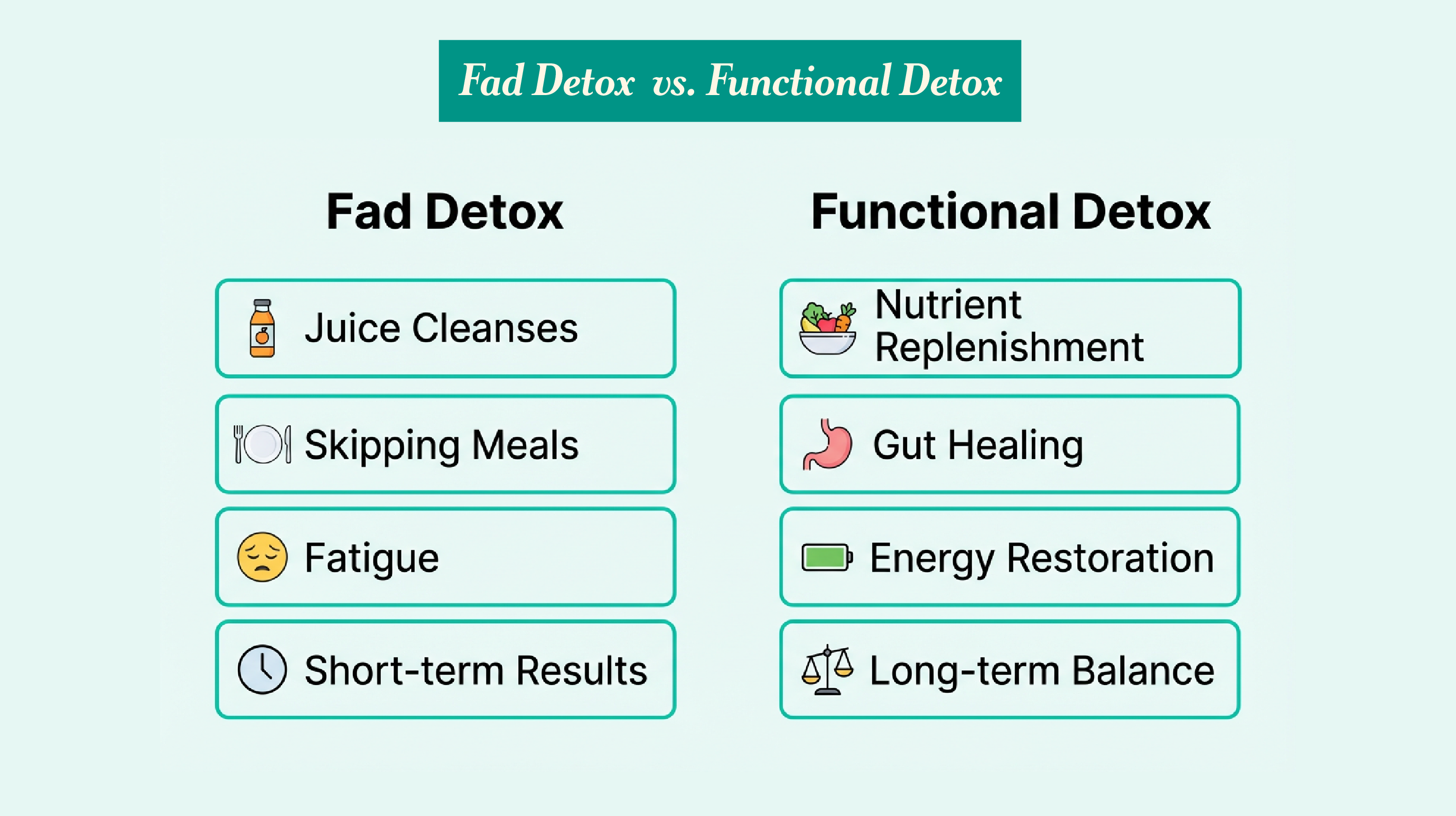
Recharge Cellular Energy: The Mitochondrial Reset
When your metabolism feels “off” post-festivities, in the form of brain fog, sluggish mornings, or low stamina, it's a sign that your mitochondria are likely exhausted. These cellular powerhouses convert the nutrients into energy, but oxidative stress from festive overeating, pollutants, and alcohol can impair them.
Functional Nutrients for Recovery of Mitochondria:
- Magnesium Bisglycinate is a calming mineral supporting around 300 enzyme reactions, involving the production of ATP.
- CoQ10 is crucial for mitochondrial respiration and also protects against oxidative stress.
- Omega-3 Fatty Acids reduces inflammation, enhances integrity of mitochondrial membrane, and improves fat metabolism.
- Vitamin C regenerates other antioxidants and also supports detox enzyme activity.
- Astaxanthin is a carotenoid that minimises inflammation and also supports recovery post-stress.
- B complex as it acts as necessary cofactors - NADH, FADH to run the Krebs cycle and electron transport chain.
For functional nutrition practitioners, mitochondrial repair is an advanced clinical concept, covered extensively in Building Strong Foundations of Cellular Health with Peptides & Bioregulators short course in iThrive Academy. This course teaches how specific peptides promote cellular rejuvenation and optimizes the performance of mitochondria after toxin exposure or stress.
Balance Blood Sugar and Inflammation
Diwali treats are well loaded with refined fats and sugar that can cause glucose spikes and inflammation, eventually leaving you foggy and tired. Resetting your insulin sensitivity is key to post-festive balance.
Tips for Blood Sugar Balance:
- Pair carbs or sweets with healthy fat or protein to slow down absorption of glucose.
- Add turmeric, cinnamon, and fenugreek to meals as it improves insulin sensitivity.
- Opt for complex carbs such as millets, quinoa, and sweet potatoes for stabilizing energy.
- Involve herbs, berries, and citrus fruits as they are antioxidant-rich and also support liver detox enzymes.
To understand the functional nutrition science of metabolic repair and insulin balance, the Nutrition for Heart Health short course at iThrive Academy provides key insights on how blood sugar, detoxification, and cardiovascular are interconnected with each other.
.webp)
Restore Rhythm: Hydration, Sleep, and Recovery Nutrition
Even the best nutrition won’t be helpful if the body is dehydrated, overstressed, or underslept. Functional recovery is all about restoring the circadian rhythm, which is the natural clock of your body that regulates detox enzymes, energy cycles, and hormone release.
Post-Diwali Recovery Habits:
- Hydration with electrolytes: Add pink salt, magnesium, lemon juice, and mint to support filtration of kidney and mineral balance.
- Sleep for at least 7 to 9 hours, your brain and liver detox pathways are most active during deep sleep.
- Limit blue light exposure post-sunset as it suppresses melatonin, further disrupting natural detox timing.
- Adaptogens such as Rhodiola and Ashwagandha support the HPA axis, minimizing cortisol, reducing fatigue and managing stress.
Pro Tip: A magnesium-rich drink like warm water + pinch of magnesium bisglycinate before bed enhances the relaxation of muscles and also supports overnight detox.
At iThrive Academy, the students learn how rhythms, metabolic cues, and nutrient timing form the core foundation of sustainable recovery. Functional Nutrition does not isolate the body, it rather integrates balance, biology, and behaviour.
Final Thoughts
Your Post-Diwali recovery does not need to be extreme, it just needs to be intentional. By supporting liver detox, , rebalancing your gut, stabilizing blood sugar, recharging mitochondria, and restoring circadian rhythm, you help your body do exactly what it is designed for: heal and thrive.
At iThrive Academy, India’s first Functional Nutrition academy, we do not just teach “detox”, we also teach biological intelligence. Through programs like the iCFN program, practitioners learn to translate the biomarkers into actionable plans, develop recovery protocols, and also restore true vitality.
At iThrive Academy, we empower practitioners with in-depth knowledge, pioneer innovation via data-driven nutrition science, and transform the way health and recovery are achieved.
This post-Diwali, let your reset be truly real, right from cells to your soul.



.png)


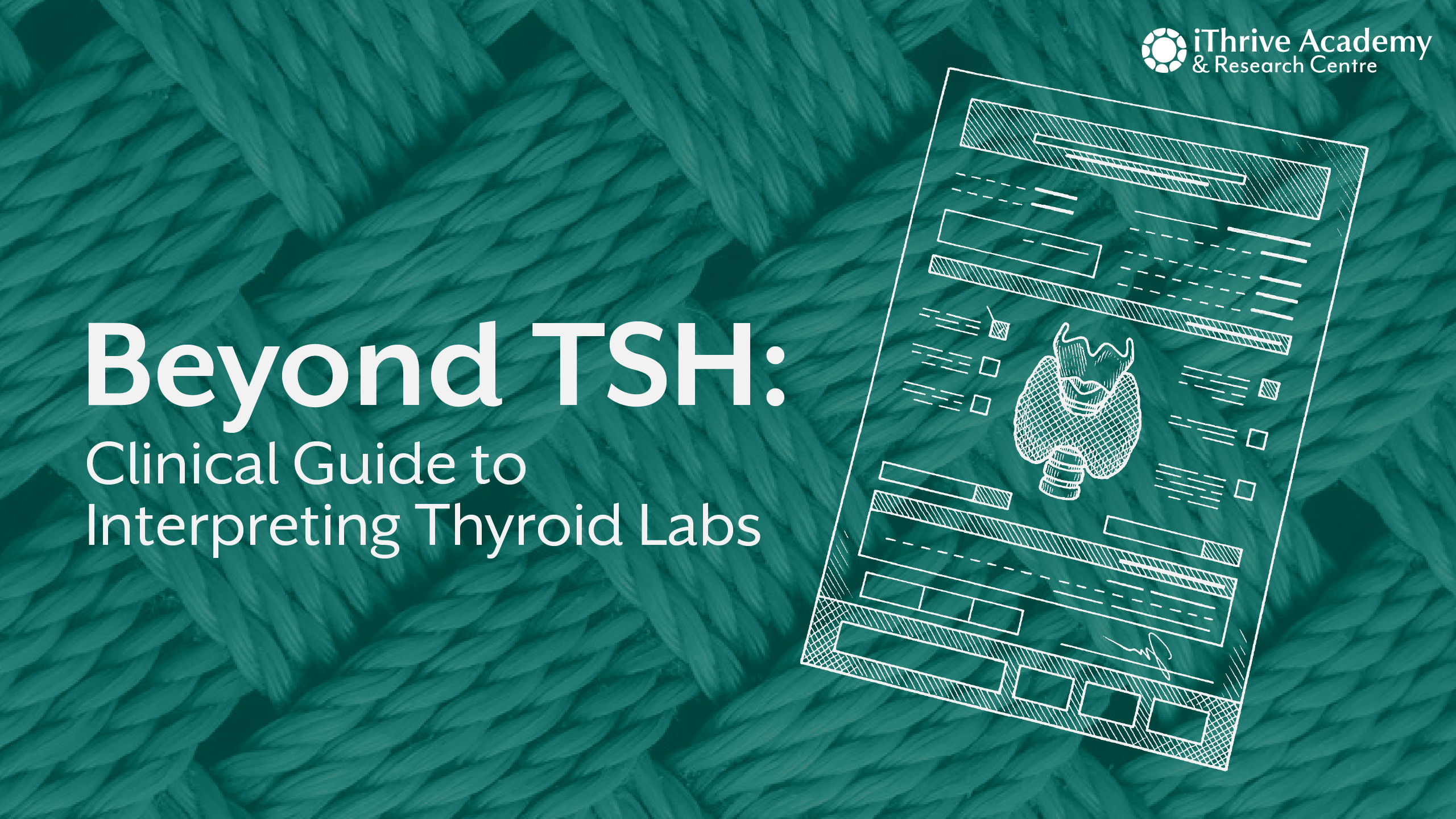


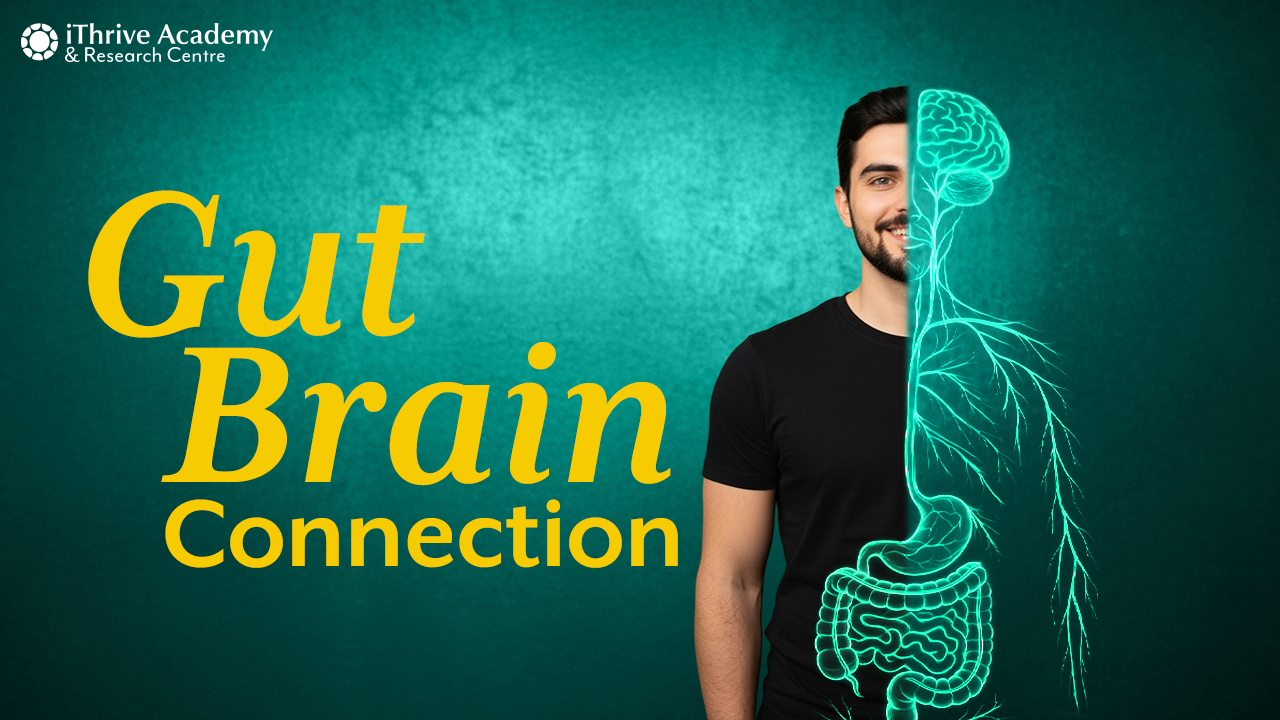


.jpg)



